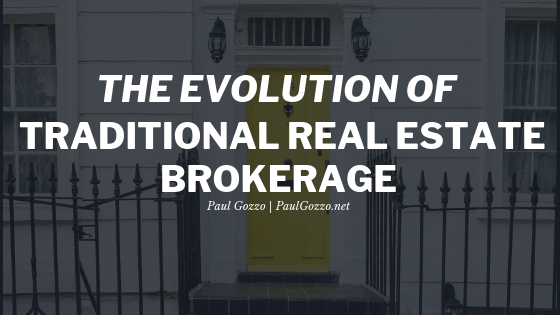Traditional residential real estate brokerage is evolving, as technology continues to change the way real estate is bought and sold. Traditionally, residential home buyers and sellers meet with an agent who takes them throughout the entire process of buying or selling a home. However, the more today’s consumers become tech-savvy, traditional real estate models that many agencies have employed will begin to see competition as new brokerage options join the mix.
Most people are somewhat familiar with the process of buying or selling a home. That being said, the process can often be very complex, fast, and intimidating, especially to the first-time home-buyer or seller. This is commonly where a real estate brokerage enters and agents can be very helpful, especially in explaining how the process works and why certain things are done such as open houses and inspections. Real estate brokers and their agents represent individuals throughout the buying or selling process by assisting with all of the various components and appointments associated with each property including property listings, showings, contracts, transactions, and providing an overall explanation of the required processes. But with the evolving advancements in technology and business strategies, many companies are starting to see a disruption in how traditional residential real estate brokerage operates and are beginning to adapt their business models to keep up with the new consumer demand.
Cloud-Based Brokerage
Real estate agents may now have the option to work remotely instead of commuting into the office every day. Companies such as exp Realty operate based on this model, allowing their brokers to work independently through an online network with other agents. Through the company’s program eXp World, agents create an avatar to use in a virtual office setting. Avatars can walk up to other avatars to engage in conversation, ask questions, and attend meetings and training. There are several benefits of operating on this business model. For one, it cuts costs associated with office space and services that provide online documentation and communication. For the agents, cloud-based brokerage can offer a way to serve their clients better.
iBuyers
For some consumers, real estate brokers are completely taken out of the process of buying and selling residential real estate. Now, companies such as Zillow and OpenDoor are buying and selling homes in the market. Through this model, a homeowner can simply create an account and request an offer for their home. Home sellers can receive an almost instant offer on their homes, on their timeline, creating a quick and smooth process for both sellers and buyers. Buyers can even check in to a house for sale through an app and take a virtual tour. Many iBuyer businesses have also begun to launch partnerships with agents in the area. This way, if a home is outside of the company’s buying criteria, sellers can be instantly matched with an agent to complete the process.
It’s hard to say exactly where real estate brokerage will end up, but the more consumers become savvy to technology, the more brokers will need to evolve. While it’s clear home buyers and sellers want to be more involved in the buying and selling process, there is still much evidence that meeting face to face with an agent is requested by many who are new to the real estate market. I believe that over time, this will fade along with commission pricing ultimately leading to a much more efficient process with less human interaction and more data.

